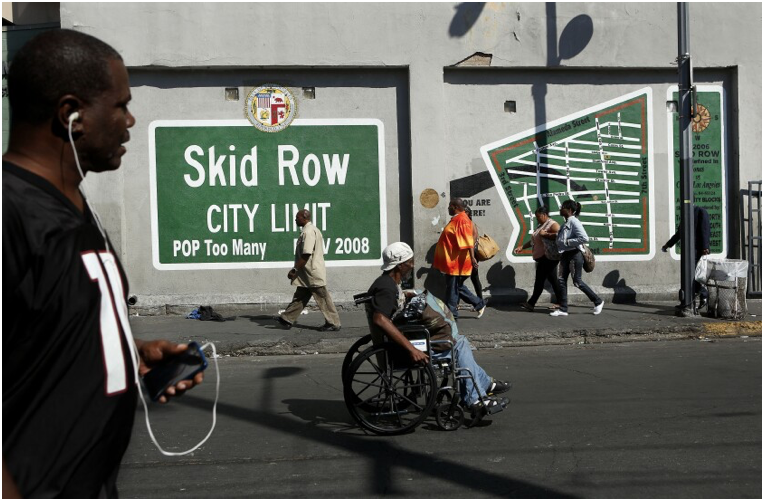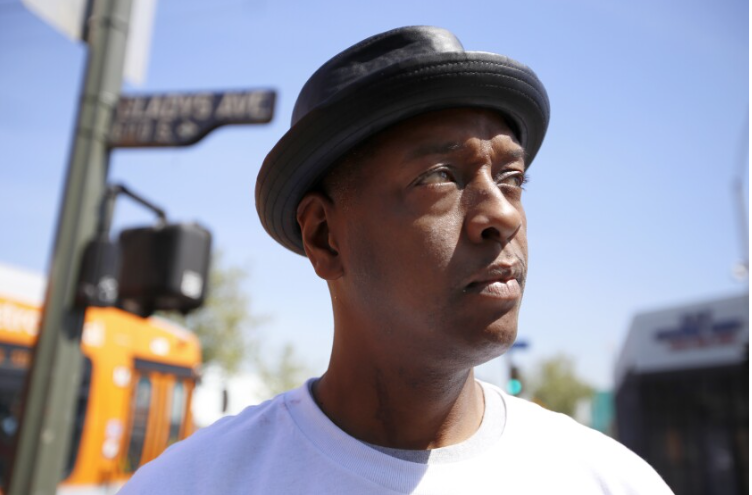CommentsGENERAL JEFF LEAVES POWERFUL LEGACY - (Editor's Note: Jeff Page, "General Jeff", wrote about LA's Skid Row and LA Homelessness for CityWatch for more than 10 years. He wrote from firsthand knowledge, trying to help us understand what most of us cannot comprehend. He will be missed.)
A conference in a lawsuit accusing local government of bungling its homelessness response was winding down with the usual federal courthouse pomp when a booming voice broke in from the back.
“I don’t believe the voices of skid row have been heard,” bellowed General Jeff Page, skid row community leader Pete White recalled Page telling U.S. District Judge David O. Carter. Soon the judge and Page were “thick as thieves,” White said, traipsing around skid row homeless tents at all hours, in a relationship that by some accounts influenced the judge’s orders.
“After a year, the judge sounded more like General Jeff than General Jeff,” said White, a member of the Los Angeles Community Action Network.
Page, a West Coast hip-hop pioneer who earned the name “mayor of skid row” while fighting to reclaim skid row from its city designation as a homelessness “containment zone,” died Oct. 13 at 56 after suffering a stroke and heart problems.
His “positivity” movement left an indelible mark on the skid row landscape. A mural map of the area’s city limit is marked “Pop: Too Many.” A world-class basketball court that Page brought Nike in to build for the 3-on-3 basketball league he founded. Christmas lights at Gladys Park and outdoor movies on hot summer nights.

Even as upscale development closed in from all sides, Page helped change the narrative on skid row, which he championed as one of the city’s last majority-Black neighborhoods, made up of renters, recovery workers and homeless people who deserved their own political voice. He was continuing to fight for a separate neighborhood council for the 50-block downtown district when he fell ill.
“We’ve lost a titan in skid row,” said White, “one of the greatest activists, and one of the community’s loudest megaphones.”
Page was a proud native of South Los Angeles and played basketball at Crenshaw High School, a court leader, which earned him the nickname “General,” said his niece Tanesha Johnson.
The name stuck as he became an integral member of the emerging West Coast hip-hop scene. While in high school he joined a street crew that posted telephone pole fliers for dances featuring often-overlooked pioneers such as Uncle Jamm’s Army, Johnson said.
His affiliations also included the L.A. Dream Team and the hip-hop group Bobby Jimmy and the Critters, Johnson said. General Jeff, who as a child had roles in a horror film and commercials, wrote lyrics for the group and played a falsetto-rapping insect with bobbing antennae in the Critters’ video parody “Roaches,” a takeoff on the hit song “Rumors.”
Pastor J’n Marie Cue of skid row’s Church Without Walls first met Page in 1988 in Texas. Page was touring as a hype man for Rodney O and Joe Cooley. Their classic 1987 anthem “Everlasting Bass” is considered the origin of the Florida hip-hop subgenre Miami Bass, sampled by artists such as Lil Wayne. Cue’s group, the College Boys, opened for the group.
“He was a very charming individual, someone people gravitated toward,” Cue said.
Page produced and mixed music for other performers and kept his hand in hip-hop as an assistant to MC Eiht and DJ Quik, who worked with the biggest names in L.A. gangsta rap, including Dr. Dre, the late Eazy-E and Ice Cube, Johnson said.
Page was the fun uncle, cracking jokes and playing with the kids, said Johnson, who survives him, along with his sister Jacqueline Anderson, brothers Jerome Anderson, Johnnie C. Page, Johnathan Page and Deacon Ronnie Page, and nephew Terraine Williams.
(Gale Holland covers homelessness and poverty for the Los Angeles Times.)
















